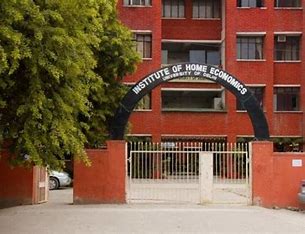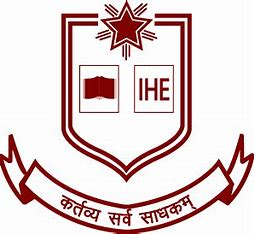
Institute of Home Economics (IHE), New Delhi

Institute of Home Economics (IHE), New Delhi
Address:
Institute of Home Economics
F-4, Hauz Khas,
New Delhi – 110016, India
Overview:
The Institute of Home Economics (IHE) is a prestigious educational institution located in Hauz Khas, New Delhi. Established in 1961, the institute is one of the oldest and most prominent centers for learning Home Economics in India. It is an academic department under the University of Delhi, offering a range of undergraduate, postgraduate, and diploma programs in Home Economics and related disciplines.
The institute’s primary goal is to provide a comprehensive education in the field of home science, focusing on subjects such as nutrition, health, human development, family resource management, and clothing and textiles. IHE’s holistic approach combines the theoretical understanding of these topics with practical applications, preparing students for various professional roles in the public and private sectors.
Academic Programs
The Institute of Home Economics offers programs that cater to diverse career paths related to family and consumer sciences, healthcare, nutrition, and education. The curriculum emphasizes multidisciplinary learning, combining elements from science, technology, social sciences, and management.
1. Undergraduate Programs
The undergraduate programs at IHE are designed to provide students with a solid foundation in home economics, preparing them for careers in nutrition, education, counseling, resource management, and related fields.
The major undergraduate courses offered include:
- B.Sc. (Hons.) Home Science:
This is the flagship undergraduate program at IHE, offering a 3-year degree that equips students with in-depth knowledge in subjects such as nutrition, child development, family resource management, and textiles. The program also includes a practical component with laboratory work and field-based learning experiences. - B.Sc. (Hons.) Food Technology:
This program blends home science with the latest advancements in food science and technology. It is aimed at students interested in food industries, food processing, and research in food science. The course also covers food microbiology, quality control, and food safety management. - B.A. (Hons.) Economics:
IHE offers this program for students who are interested in a broader social science approach, focusing on economic principles with an emphasis on how they relate to human behavior, family systems, and resource management. - B.Sc. (Hons.) Fabric and Apparel Science:
This program focuses on textiles and clothing, with courses related to textile science, apparel production, and design. It prepares students for careers in the fashion industry, textile design, and retail sectors.
2. Postgraduate Programs
The postgraduate programs at IHE are designed for students who wish to specialize in specific aspects of home economics and further their careers in academia, research, or industry.
The major postgraduate courses offered include:
- M.Sc. Home Science (Specialization in Food & Nutrition or Human Development):
This program provides advanced knowledge in the areas of food science, nutrition, and human development. The program emphasizes research, hands-on practice, and scientific investigation in family and community nutrition, dietetics, and child development. - M.Sc. Food Technology:
This program focuses on advanced food processing, food chemistry, food safety, and technology, preparing students for leadership roles in the food industry, R&D, and food production management. - M.Sc. Textile Science:
For students interested in textile engineering, design, and production, this program delves into textile materials, garment production, fabric technology, and the sustainable design of textiles. - Postgraduate Diploma in Dietetics and Public Health Nutrition:
This is a professional diploma course that provides training in public health nutrition and dietetic counseling. It prepares students for careers as dietitians or nutritionists in hospitals, health centers, or NGOs.
3. Doctoral Program
- Ph.D. in Home Science:
For students wishing to pursue research, the institute offers a Ph.D. program in Home Science, with specializations in Food & Nutrition, Human Development, and Textiles. The Ph.D. program focuses on applied research, aiming to improve community health and well-being through innovation in family resource management, nutrition, and human development.
Curriculum and Learning Approach
The curriculum at the Institute of Home Economics is multidisciplinary, integrating subjects from science, healthcare, management, technology, and social sciences. Students engage in both theoretical learning and practical applications to develop critical thinking, problem-solving, and communication skills, which are essential in their future careers.
Some key focus areas within the curriculum include:
- Human Nutrition and Dietetics: Understanding the importance of proper nutrition for health, disease prevention, and management.
- Child Development and Family Studies: Addressing issues related to child growth, parenting, family life, and gender studies.
- Textiles and Apparel Science: Analyzing fabric design, production, and sustainability in the textile industry.
- Family Resource Management: Applying concepts of financial management, home economics, and consumer behavior to improve family and community well-being.
The curriculum is supplemented by fieldwork, internships, and practical sessions, where students get to engage directly with industries, NGOs, government bodies, and communities.
Infrastructure and Facilities
The Institute of Home Economics provides a rich set of facilities to enhance student learning and development. Some notable infrastructure features include:
1. Laboratories:
The institute has specialized laboratories for different domains of home science, such as:
- Food and Nutrition Labs for practical learning in food science, nutrition assessment, and diet planning.
- Textiles and Clothing Labs for textile testing, garment designing, and production.
- Child Development Labs where students can conduct research and engage in child-centered activities.
2. Library:
The library at IHE is well-stocked with books, research journals, and online resources relevant to home economics, food science, nutrition, and family studies. Students and faculty also have access to a variety of digital resources to assist with research and academic learning.
3. Hostel Facilities:
The institute provides hostel accommodations for both male and female students. The hostels are equipped with essential amenities, including Wi-Fi, dining services, and recreational spaces, ensuring a comfortable living experience for students.
4. Auditorium and Seminar Halls:
The institute hosts a range of academic and extracurricular events. Its well-equipped auditorium and seminar halls are used for conferences, workshops, guest lectures, and cultural events, providing students with exposure to different learning and networking opportunities.
Industry Collaborations and Internships
The Institute of Home Economics has strong connections with various industries, healthcare institutions, and NGOs, which facilitate valuable internships, trainings, and live projects for students. These collaborations help students gain real-world experience and prepare for professional careers in their respective fields.
The internship programs allow students to work with food companies, hospitals, NGOs, educational institutions, and research agencies, applying their academic knowledge in real-world settings. Internships also help students build networks, develop communication skills, and gain exposure to industry trends.
Placements and Career Opportunities
The placement cell at the Institute of Home Economics works to connect students with career opportunities in various sectors. Graduates from IHE have gone on to have successful careers in industries such as:
- Food and Beverage Industry (as nutritionists, dieticians, and food technologists)
- Textile Industry (as fashion designers, textile engineers, and product developers)
- Child Development Centers (as child psychologists, development specialists, and social workers)
- Public Health Sector (as public health nutritionists, dietitians, and health educators)
IHE alumni are also known to take up leadership roles in NGOs, corporate sectors, government programs, and academic institutions, where they work to improve the quality of life in communities, focusing on health, nutrition, and family welfare.
Research and Development
Research at IHE is focused on real-world applications that directly impact the health and well-being of communities. Faculty and students collaborate on projects related to:
- Community Nutrition and its impact on public health
- Sustainable Food Systems and food security
- Textile Sustainability and eco-friendly production methods
- Child Development and innovative education techniques
The institute also encourages interdisciplinary research, where students can explore topics that span across home economics, sociology, psychology, and public health.
Student Life and Extracurricular Activities
Apart from academics, IHE places significant emphasis on overall personality development through a variety of extracurricular activities. The campus hosts events and activities such as:
- Cultural Festivals showcasing student talent in arts, drama, dance, and music.
- Workshops on nutrition, food preparation, sustainability, and textile design.
- Sports Events for students to engage in physical activities and team-building exercises.
There are also clubs and societies within the campus, such as the Fashion Club, Nutrition Club, and Textile Society, where students can pursue their interests and enhance their skills.
Conclusion
The Institute of Home Economics (IHE) in New Delhi is a leading educational institution offering comprehensive courses in Home Science, Food & Nutrition, Textiles, Child Development, and Family Resource Management. With its emphasis on practical learning
Courses/Programs
| Serial# | Title | Estimated Cost | Program type |
|---|
Campuses
Reviews
Average rating
0.0 / 5
Rating breakdown
Submit your review

- Location
Institute of Home Economics F-4, Hauz Khas, New Delhi - 110016, India Click address for directions
- Phone
- Fax
- Web Site